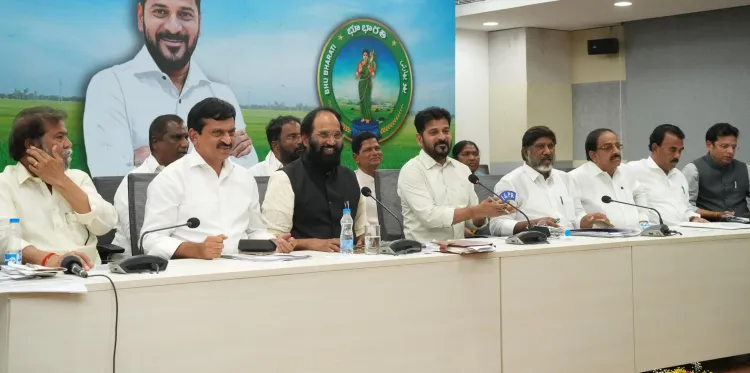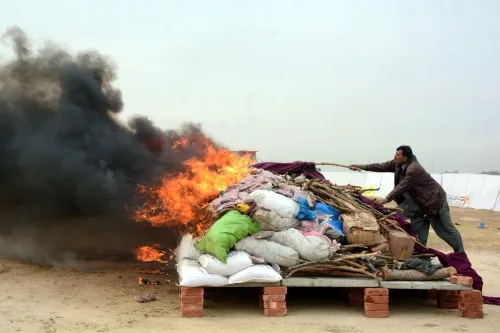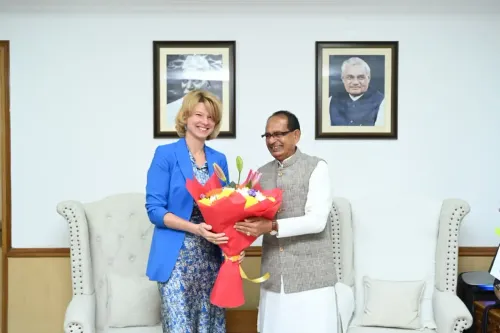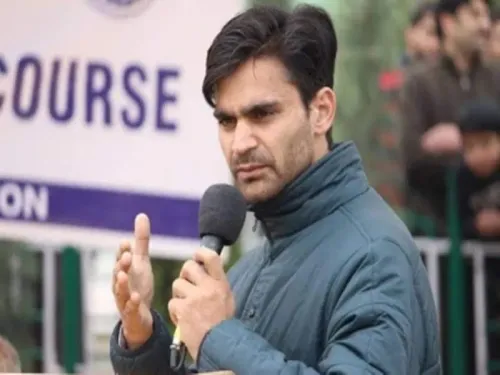What Actions Will Telangana Take Regarding the Kaleshwaram Commission Report?

Synopsis
Key Takeaways
- The Telangana government is set to discuss the findings of the Justice P.C. Ghose Commission.
- All political parties will have the opportunity to express their opinions on the report.
- The report highlights serious governance failures in the Kaleshwaram project.
- Chief Minister A. Revanth Reddy emphasizes a non-vindictive approach.
- Financial irregularities have raised concerns about the project's management.
Hyderabad, Aug 4 (NationPress) The government of Telangana is set to present the findings of the Justice P.C. Ghose Commission regarding the Kaleshwaram Lift Irrigation Project in the Assembly, with Chief Minister A. Revanth Reddy announcing that a decision regarding subsequent actions will be made after consulting all political factions.
This decision emerged from a Cabinet meeting led by the Chief Minister.
In a press briefing following the meeting, the Chief Minister confirmed that the report will be introduced in the Assembly, ensuring that all political entities have the chance to express their views.
Following a comprehensive assessment of the opinions presented by all parties, the government will determine the next steps to implement the Commission's recommendations.
Revanth Reddy emphasized that the government's aim is not to pursue vengeance or harbor personal grudges against anyone.
He criticized the former BRS administration for not only renaming the project initiated during the Congress regime in united Andhra Pradesh but also for redesigning it, inflating costs, and engaging in corruption.
The Cabinet endorsed the 660-page document from the Commission, which was chaired by a former Supreme Court judge, Ghose. A three-member committee of officials reviewed the Commission's findings and presented a summary to the Cabinet.
The report identified former Chief Minister K. Chandrasekhar Rao (KCR) as directly and indirectly accountable for the irregularities and illegitimacies involved in the planning, construction, and maintenance of three barrages.
The Commission concluded that the entire initiative was marked by “widespread and blatant procedural and financial irregularities”.
The report highlights that the Kaleshwaram project, projected as the “lifeline of Telangana,” ended up as a significant misallocation of public funds due to severe governance failures, poor planning, inadequate technical oversight, and financial mismanagement, all influenced by political leadership.
Deputy Chief Minister Mallu Bhatti Vikramarka clarified that this is not merely a governmental report but the outcome of an independent judicial commission that conducted a thorough inquiry.
He noted that the project, which incurred an expenditure of around Rs 1 lakh crore, is now at risk of collapse, prompting the government to initiate a judicial investigation. The Commission's report was compiled after consultations with various stakeholders, devoid of political bias, he stated.
Irrigation Minister N. Uttam Kumar Reddy presented the findings of the judicial commission concerning the three barrages (Medigadda, Annaram, and Sundilla) situated along the Godavari River.
He pointed out that a project once hailed as the lifeline of Telangana has crumbled despite substantial financial investments. He accused the previous administration of jeopardizing the future of four crore residents of the state by securing Rs 84,000 crore in loans at exorbitant interest rates.
The minister highlighted that the Pranahita-Chevella project, originally planned at Tummidihatti with an estimated cost of Rs 38,000 crore to irrigate 16.5 lakh acres, was inexplicably relocated to Medigadda after the BRS assumed power, following an expenditure of Rs 11,000 crore for irrational reasons.
The Commission stated, “It can be unequivocally asserted that there were serious irregularities from the conceptualization of the Kaleshwaram project to the issuance of administrative approvals on 1-3-2016 for the construction of three barrages. This is not a decision of the government but of individuals.”
It was found that the KCR government ignored the recommendations of an expert committee which had advised against the construction of a barrage at Medigadda.
The report emphasized that the former Chief Minister was determined to construct the barrage at Medigadda, disregarding expert advice, and that those involved in the decision-making process facilitated this.
The Ghose Commission observed that the Cabinet had not ratified the administrative approval of Rs 2,591 crore for the Medigadda barrage.
According to the findings, the former Chief Minister made decisions that unduly benefited certain agencies, leading to significant financial losses.
“One contributing factor to the inadequate operation and maintenance, culminating in the barrage's failure, was due to the impounding of water. It has been explicitly stated that the then Chief Minister directed authorities to fill the barrages to capacity for the purpose of lifting water through pump houses. Consequently, the former Chief Minister acted against the state's interests and lacked a genuine commitment to safeguard the three barrages built at a substantial expense of public funds,” the Commission noted.
It remarked that the Chief Minister acted not as the head of the government but as the executive agent.
The report indicates that the then Finance and Planning Minister Eatala Rajender was complicit, and the former Irrigation Minister T. Harish Rao permitted the Chief Minister to pursue his agenda.
The report also details the substantial cost overruns, noting that the project, initially estimated at Rs 38,500 crore for PCSS, escalated to Rs 71,436 crore for Kaleshwaram, with revised administrative approvals exceeding Rs 1,10,248.48 crore by March 2022.
The Expert Committee observed that moving the project from Tummidihatti to Medigadda would render approximately Rs 6,000 crore of previously completed work as wasteful, in addition to an extra Rs 1,500 crore for tunnel lining and land acquisition expenses.
The Kaleshwaram Irrigation Project Corporation Limited (KIPCL) had secured loans totaling Rs 87,449.15 crore (as of March 2022) under state government guarantees.










